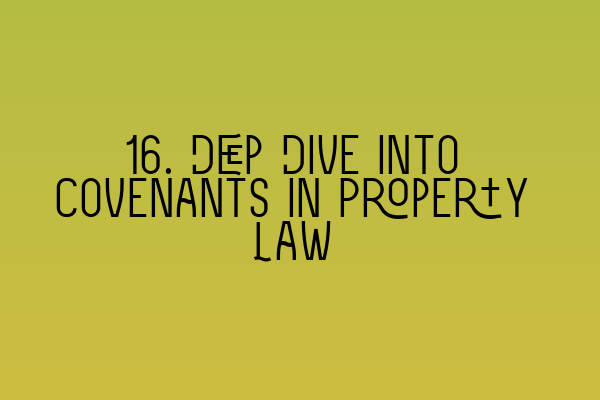**16. Deep Dive into Covenants in Property Law**
Welcome to the SQE Property Law & Land Law blog, where we provide comprehensive information on the legal aspects of property and land ownership. In this article, we will be taking a deep dive into covenants in property law, exploring their significance, types, and enforcement. Whether you’re a law student preparing for the SQE exams or a legal professional seeking to refresh your knowledge, this article will provide you with valuable insights into this crucial aspect of property law.
Before we jump in, if you’re looking for more practice exam questions to enhance your preparation for the SQE 1 exam, check out our [SQE 1 Practice Exam Questions](https://fqps.co.uk/sqe/sqe1-preparation/mcq-practice-quiz) article.
Now, let’s explore the world of covenants in property law!
**Understanding Covenants**
In property law, a covenant refers to a contractual agreement between two or more parties regarding the use, maintenance, or restriction of a property. These agreements are typically included in a deed or lease and can have a significant impact on the rights and obligations of the parties involved.
Covenants serve various purposes, including:
1. **Restrictive Covenants:** These covenants place limitations on the use of the property, ensuring that it is used in a specific manner. For example, a residential property might have a covenant prohibiting the construction of commercial structures.
2. **Positive Covenants:** Positive covenants, on the other hand, require a party to do something. For instance, a property owner might be required to contribute to the maintenance of a shared road.
3. **Covenants Running With the Land:** Some covenants are said to run with the land, meaning that they are binding on subsequent owners of the property. This ensures that the obligations and benefits of the covenant continue even if the property changes hands.
**Types of Covenants**
There are several types of covenants in property law, each serving a unique purpose. Let’s explore the most common ones:
1. **Covenants for Quiet Enjoyment:** These covenants guarantee the enjoyment of the property without interference by the landlord or any third party.
2. **Covenants to Repair:** These covenants require the tenant or owner to maintain and repair the property, ensuring that it is kept in good condition.
3. **Covenants to Insure:** Some covenants require the tenant or owner to obtain insurance coverage for the property, protecting against potential damages or liabilities.
4. **Covenants Against Assignment or Subletting:** These covenants restrict the tenant’s ability to assign or sublet the property without the landlord’s consent.
5. **Covenants Against Nuisance:** These covenants restrict the tenant or owner from engaging in activities that may cause a nuisance to other nearby properties.
**Enforcement of Covenants**
The enforcement of covenants in property law is a complex process that requires legal expertise. Covenants can be enforced by various means, including:
1. **Injunctions:** In cases where a breach of covenant is ongoing or likely to occur, an injunction can be sought to prevent the breach from happening or to rectify the situation.
2. **Damages:** In some situations, monetary damages may be sought to compensate for any losses resulting from a breach of covenant.
3. **Specific Performance:** Specific performance is a remedy where the court requires the breaching party to fulfill their obligations as outlined in the covenant.
**Conclusion**
In conclusion, covenants play a vital role in property law, ensuring that property owners and tenants understand their rights and obligations. By exploring the different types of covenants and their enforcement methods, we hope to have provided you with a comprehensive overview of this complex area of law.
If you found this article helpful and would like to access more preparatory materials for the SQE exams, consider checking out our [SQE 1 Practice Mocks FLK1 FLK2](https://fqps.co.uk/sqe/sqe1-preparation/practice-mocks-quiz) and [SQE 2 Preparation Courses](https://fqps.co.uk/sqe/sqe2-preparation). Stay updated with the [SRA SQE Exam Dates](https://fqps.co.uk/sqe/sqe1-sqe2-exam-dates) to plan your exam preparations effectively.
Thank you for reading and stay tuned for more informative articles on property law and land law from SQE Property Law & Land Law.
